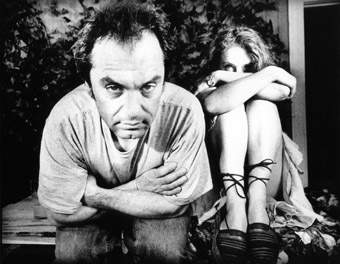aout – un repas à la campagne: subtle realities
anna russell

Henri Chassé, Annick Bergeron, Août – un repas à la campagne
photo Rolline Laporte
Henri Chassé, Annick Bergeron, Août – un repas à la campagne
A meal in the country; what a lovely idea. We could sit on this long narrow porch by the maple trees, and drink lemonade while Grandma gathers fresh eggs for an omelette. If only it weren’t so beastly hot. Heat always brings out the worst in people.
Monique (Marie Tifo) and André (Jacques L’Heureux) are fifty-something city dwellers who just got engaged, and have come out to the country for a pleasant celebration on Monique’s brother’s farm. The marriage is imminent and clearly doomed. “He likes women who wear bracelets,” Monique says of her fiancé. “And then he gave me some.” She thrashes her arms with their cheap bangles. André is an emotional lightweight, who says golf “helped me grow as a human being.” But somehow the presence of this outsider adds the extra pressure that will crack the entire family by curtain, just 70 minutes away.
We know it’s a tragedy from the start only because that’s how it’s billed, and the dramatic tension in what appears to be a comedy comes from trying to guess the family secrets, whom the tragedy will strike, and what the agent of disaster will be. The play is shot through with false dangers: an escaped snake, the rusty chains of the porch swing, a heart condition in a heatwave. Even the acid rain that’s destroying the maple syrup crop sounds like it has potential to turn the plot. “A mystery is a mystery until it isn’t a mystery any more,” Monique says. “And then? I love that feeling.” The playwright guides the audience towards the feeling Monique loves. As it turns out, the real danger comes from the people to whom we are closest. We can’t always see it because our eyes can’t focus in that proximity.
Jean Marc Dalpé’s Août: un repas à la campagne is a realistic play in a naturalistic setting that takes place almost entirely in real time. A classic drama, Août demands strong ensemble acting, and depends entirely on the text to work. This ensemble delivers, with no one actor dominating the stage, and no one character pitched too high or too low. The actors never seem to be acting; they’re just normal people doing and saying regular things. Fernand Rainville’s direction moves the eight characters naturally on the long narrow stage, and a family we’ve never met before starts to look very familiar. Design elements are deliberately spare. Crickets chirp. The lights change twice. The effect of this restraint is powerful.
In describing Dalpé’s writing, the program notes use the concept of ‘justesse” (roughly: the accuracy that allows authenticity). Everything is purposeful, and everything contributes to the final effect, which happens entirely without words. It’s no mistake that people keep blocking each other in the driveway, or that they keep asking for keys and are often denied. That doesn’t mean the audience always knows the purpose of each moment, although the playwright clearly does. About halfway through, Gabriel (Henri Chassé) is absolutely thrilled when he captures a long garter snake. It later escapes. Gabriel’s role in the play’s climax makes it appropriate for him to be associated with a phallic symbol, but the play is so well crafted that this long scene must have additional significance. The author plays with this gap in meaning, as the characters ask themselves what it means to catch a snake – does it represent good luck? No one is sure. Like us, the characters have lost touch with ancient symbols as the maple trees die, the golf course moves in, and they move out to the city with dreams of screenwriting glory.
The snake is seven feet long, and after the tragedy strikes, the Grandmother (Janine Sutto) returns to the stage triumphant, with seven eggs she has found. These symbols – the number seven, the snake, eggs, keys, barred passages, and the final image of a mother who should protect but instead takes on the role of avenging god – crawled over my brain like a vague ancestral memory. I knew the meanings once, maybe from hundreds of years back when every meal was a meal in the country. The play would have had an even greater effect if I could have accessed those memories in the moment of watching, but it’s also enjoyable to work away at the mystery long after the actors have gone home. Août is a rare achievement – a play that lingers and sticks, like a long, hot summer day.
Incidentally, the play, created by A Théatre de la Manufacture from Montreal in association with Vancouver’s Théatre la Seizième, is presented in its original French. English surtitles were projected above the playing area. The experience was rather like watching a three-dimensional movie with one eye shut. To really savour this text the way it deserves, nothing but full fluency would do.






